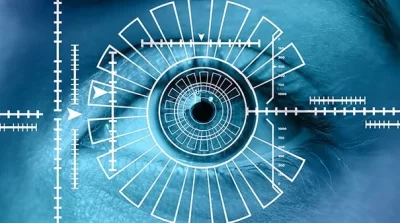Artificial intelligence is at the forefront of the news. We see it talked about every day, but many of us don’t know how it impacts our lives. You might be surprised to find out AI is affecting the eyecare industry. Could your eye doctor be using artificial intelligence to provide you with a higher level of care? It might surprise you to hear the answer. No, robots are not going to take over the job of your eye doctor, but artificial intelligence is leading to great changes in the industry. AI can perform those pesky tasks that take up too much time so your eye doctor can focus on the care of patients.
Many people mistakenly believe artificial intelligence is all about robots. While robotics is involved, AI is more about algorithms. You can think of artificial intelligence like a set of rules that computers use to solve problems. Click here to see the complete list of eye doctors that may be using artificial intelligence.
Your eye doctor may be using artificial intelligence to diagnose patients. With AI, eye doctors can use a greater level of precision to diagnose patients and with a higher level of objectivity. Imagine artificial intelligence scanning your eye images to find the problem! For instance, Google’s DeepMind not only helps your doctor determine a diagnosis, but also explains the diagnosis and all the whys. AI-powered diagnostic equipment is proving more accurate than some eye doctors because there is no human error.
While many of us have seen shows that attempt to show us the future, perhaps the future is closer than we realize. AI is now being used by many practices to diagnose diabetic retinopathy, glaucoma, and other eye diseases with precision, meaning your eye conditions can get diagnosed much sooner, before they start to cause major problems.
With people living longer and much of the population aging, its important people receive the eyecare services they need. You can think of artificial intelligence like your doctor’s partner. You may be surprised to learn AI can help provide a more accurate diagnosis so you do not have to wonder if your eye doctor is correct.
AI helps your eye doctor offer screening tools that can be used with telemedicine. One day, you may not even have to visit your doctor’s office for a screening test for diabetic macular edema. It’ll be interesting to see how this technology changes the way eye doctors provide care over the next couple of decades.
Artificial intelligence may also be used in your primary care doctor’s office. Imagine the possibilities of having eye screenings done while you go through a physical. Many eye physicians are offering telemedicine coupled with AI to provide eyecare to patients living in rural areas that might not have access to transportation.
While artificial intelligence is amazing, it can’t do it all. Your eye doctor will never be replaced with a robot, at least not in the next fifty years. Artificial intelligence only looks for what its told to look for. While intelligent, AI can miss things humans may not. Your eye doctor will continue to discover new advances in AI technology to determine what will work in their practice. Because artificial technology is expensive, smaller practices may not embrace it until it becomes more affordable.
Next time you go to the eye doctor for your annual exam, don’t be afraid to ask the doctor about the use of AI. Find out how your doctor is using this advanced technology and how it can improve your eye examination experience. It never hurts for eye doctors to get a little help when diagnosing patients. Having a computer program analyze your eye health ensures you get a proper diagnosis each and every time.
